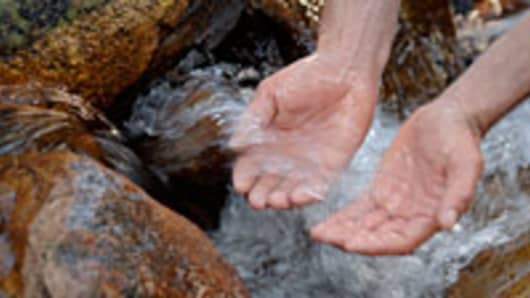It is well known that Australia is a world leader in the trade of commodities like iron ore and coal. Less known, is that Australia is also leading the world in the trade of a more vital and yet undervalued commodity – water. According to a growing number of investors, the market for water could be the next big investment opportunity of the 21st century.
Richard Lourey who has been working in the financial markets since 1986 has never been more excited about an opportunity he now sees each time he turns on the tap. Lourey, Managing Director of the Causeway Water Fund, is part of a growing group of Australian investors attracted to the potential of water.
“It’s a simple case of static supply meets growing demand and we think that will get translated to higher prices,” says Lourey.
Over the past few years, trade in water has boomed. The Australian industry is now valued at up to $27 billion, while last year alone over $3 billion in water rights were traded in the open market. During the recent drought many farmers survived by selling their water entitlements. In some cases the entitlements were worth more than the land they owned.
A number of startling facts explain why many believe this market can only continue to grow. Seventy percent of the earth’s surface is covered by water, but less than 1 percent is readily accessible for human consumption. According to the United Nations by 2025 roughly two thirds of the world’s population will live in areas that suffer from severe water stress. Climate change, pollution and population growth will only add to the problem.
It’s hardly surprising then that Australia, the world’s driest inhabited continent, has developed the world’s most sophisticated system for water trading. Water rights can be bought and sold separately from land rights and traded on an open market. Investors can buy entitlements to the water and rent them back to irrigators, or sell the rights into the temporary transfer market. It’s a system the United States, Chile and Spain are all considering.
Retail investors are also taking note. Kim Morison has recently established the Blue Sky Water Fund, an Australian fund specializing in water trading. The fund plans to raise $50 million by the end of July and provide investors with medium term returns of between 10 and 14 percent per annum.
“We’ve seen capital appreciation of 8-12 percent per annum or higher in some cases, plus the ability to derive a yield each year of around 8 percent as well. It's taken time, but the big institutions are finally starting to wake up to the possibilities of water,” says Morison.
But not everyone is so upbeat. Some farmers are concerned that such a precious resource should not be tied up in the hands of a select few individuals and speculators. Matt Linegar, CEO of the National Farmers Federation, says, “There’s been a lot of concern raised about what roll speculators may play. The real concern is that foreign interests will buy up the water and land and dictate what gets grown and where, but so far I cannot point to a single example where that’s happening.”
Jonathan Barratt Managing Director of Commodity Broking also believes there are better ways to hedge against climate change and weather patterns and recommends weather certificates.
“A lot of our farmers trade rain as a weather certificate. They use it as a proxy to protect themselves against drought wiping out their crops. That’s the way we tackle it. At the end of the day, water entitlements will fluctuate depending on the amount of rain, so if you don’t get any rain they’re worth nothing.”
But according to Lourey an investment in water, is an investment in Asia’s growth. China and India hold nearly 40 percent of the world’s population, but only 11 percent of its fresh water supplies. As these countries continue to grow, so too will their appetite for water.
“If you’re looking for an asset that provides a hedge against inflation and taps into the growing demand for food security, then water satisfies that theory,” he says.


